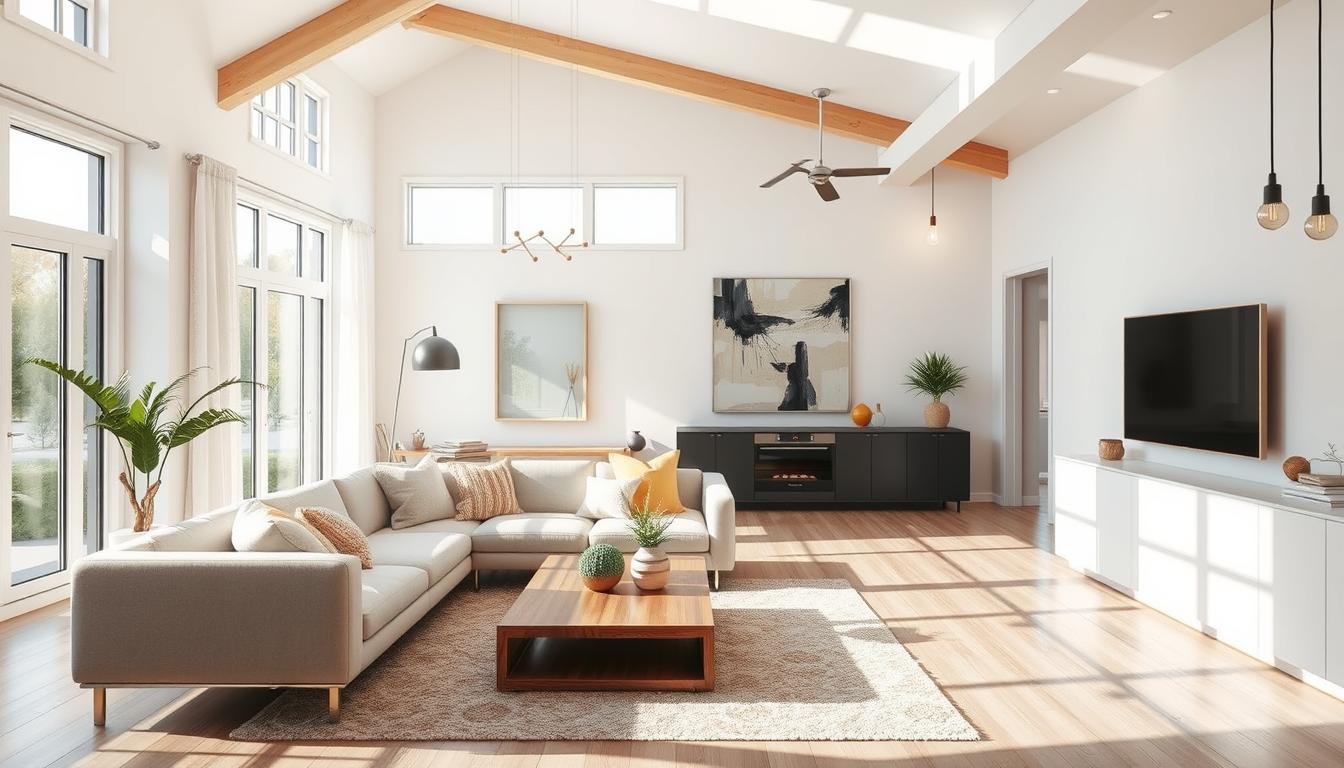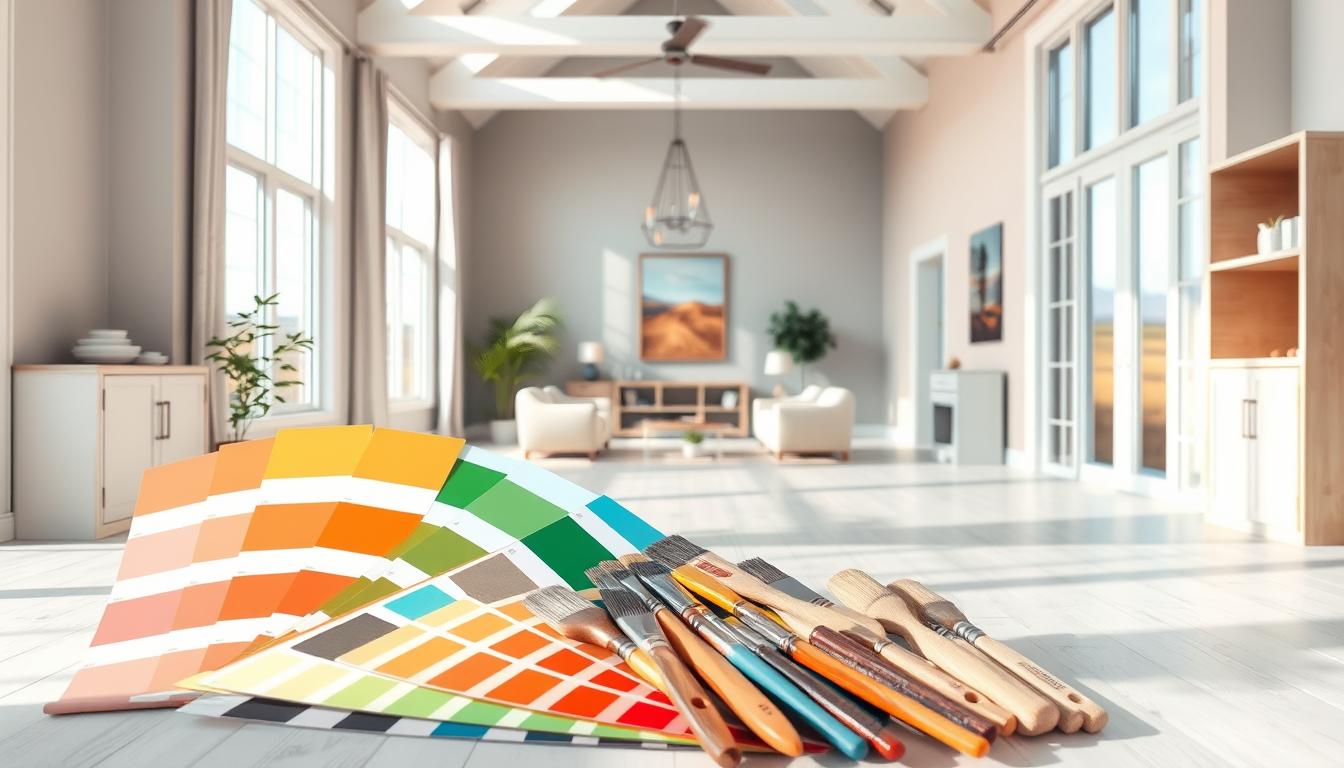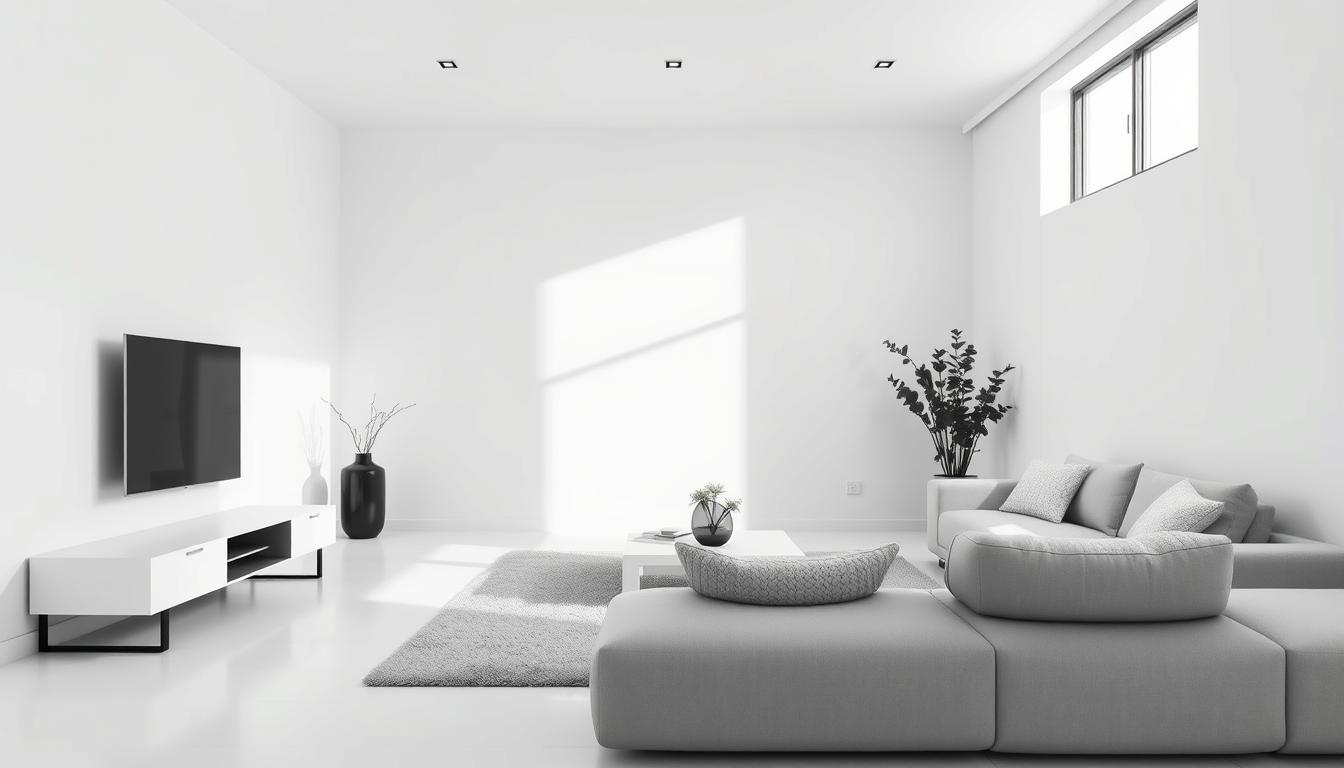Did you know a well-designed living space can make you happier and more productive? With the rise of interior design ideas, making your space better is easier than ever.
We’ll look at various interior styles to make your house a cozy haven. From sleek modern to warm traditional, we’ll cover each style’s key features. This will help you pick the best one for you.
Key Takeaways
- Discover the latest trends in interior design
- Learn how to choose the perfect style for your space
- Explore the characteristics of different interior styles
- Transform your living space into a personalized haven
- Get inspired by modern and traditional design ideas
Understanding Home Interior Styles
Exploring home decor means learning about different interior styles. These styles are more than looks; they make our homes functional and cozy.
Definition and Importance
Home interior styles are about design principles and elements. They are shaped by culture, personal taste, and architecture. Knowing these styles helps us make our homes welcoming and cohesive.
Choosing a style greatly affects a room’s vibe. For example, modern home decor brings a sleek, minimalist feel. Traditional styles, on the other hand, offer warmth and coziness.
Setting the Mood
The style we pick changes how our homes feel. Different styles bring out different emotions and moods. For instance, popular interior trends like industrial or minimalist styles open up a room and add energy.
When picking a style, think about how it will feel in your home. The right style makes your space beautiful, functional, and comfortable.
Popular Home Interior Styles
Understanding home interior styles is key to transforming our living spaces. Our home’s interior reflects our taste and where we spend a lot of time. So, picking the right style can really improve our life.
Let’s look at some top home interior styles. They’re loved for their unique looks and appeal.
Contemporary: Clean Lines and Minimalism
Contemporary design focuses on clean lines, minimal ornamentation, and an open layout. It’s great for those who like simplicity and function. It uses a neutral color palette with bold accents.
Minimalist design is a part of contemporary style. It aims to reduce clutter and focus on function. Design experts say, “Minimalism is not just about getting rid of stuff; it’s about making room for what’s truly important.”
“The minimalist aesthetic is not just a design choice, but a lifestyle that values simplicity and clarity.”
Traditional: Timeless Elegance
Traditional decor is known for its timeless elegance and classic appeal. It uses rich colors, ornate details, and comfy furnishings. It’s perfect for those who love a warm, inviting home and antique pieces.
| Characteristics | Description |
|---|---|
| Color Scheme | Rich, warm colors like reds, golds, and browns |
| Furniture | Ornate, antique, or vintage pieces |
| Decor | Intricate patterns, heavy drapery, and classic artwork |
Rustic: Warm and Inviting
Rustic style aims to create a warm and inviting atmosphere with natural materials and earthy tones. It’s great for those who love nature and want a cozy home.
Rustic decor includes exposed wooden beams, stone fireplaces, and vintage furniture. The goal is to make a space that feels cozy and welcoming.
Knowing these popular styles helps us choose the right elements for our homes. This way, we can create a space that’s both beautiful and functional.
Modern Style Explained
Modern style is loved for mixing simplicity with advanced design. It’s a favorite among homeowners for its sleek, elegant look.
Key Characteristics
Modern style focuses on functionality, simplicity, and innovative materials. Key traits include:
- Clean lines and minimal ornamentation
- An emphasis on horizontal and vertical lines
- The use of natural and synthetic materials
- A focus on functionality and simplicity
Color Palette Choices
The colors used in modern design are key to its look. Neutral tones like whites, blacks, and grays are popular. They help create a clean, minimalist vibe.
| Color | Effect | Usage |
|---|---|---|
| White | Creates a sense of openness and cleanliness | Walls, furniture |
| Black | Adds depth and sophistication | Accents, furniture |
| Gray | Provides balance and versatility | Walls, flooring |
Choosing the right colors can greatly improve the modern look of your home.
Elements of Scandinavian Design
Scandinavian design blends beauty with function, making homes both stunning and practical. It’s a style that’s gaining traction in luxury homes, aiming to create spaces that are both beautiful and functional.
Functionality Meets Aesthetics
Scandinavian design focuses on both looks and use. Each piece of furniture or decor is chosen for its beauty and usefulness. This ensures homes are tidy and peaceful.
Minimalist principles guide Scandinavian design. It chooses furniture and decor that is simple yet elegant. This simplicity makes spaces feel open and airy, even in small areas.
Natural Materials and Textures
Scandinavian design loves natural materials like wood, leather, and linen. These add warmth and texture, making spaces cozy and inviting. They also connect the indoors to the outdoors, enhancing calmness.
Using different textures in furniture, rugs, and decor adds depth and interest. Mixing textures, like leather’s smoothness with wood’s roughness, creates a sophisticated and welcoming look.
Industrial Style: Urban Charm
Industrial style brings a chic, modern vibe to homes. It’s loved for its raw, edgy look and unique feel. This design trend adds character to any living space.
At its heart, industrial style celebrates the raw beauty of buildings. It uses exposed brick, metal beams, and concrete floors. These elements are the design’s main focus.
Embracing Raw Materials
Raw materials are key in industrial style. Exposed brick walls bring a rugged charm and history to rooms. Metal accents and reclaimed wood add to the urban, organic feel.
- Exposed ductwork and pipes
- Metal lighting fixtures
- Reclaimed wood furniture
These elements enhance the look and tell the space’s story. They highlight its history and function.
Open Spaces and High Ceilings
Industrial style often features open spaces and high ceilings. These remind us of old factories and warehouses. They make rooms feel grand and open.
High ceilings enable creative lighting, like pendant lights or chandeliers from industrial materials. They become room highlights. Open floor plans also help spaces flow together, creating a sense of openness.
Industrial style combines raw materials with open spaces for a unique living area. It celebrates the beauty of the unpolished and functional. It’s ideal for those who love urban charm.
Farmhouse Style: Cozy and Charming
Farmhouse style focuses on comfort, simplicity, and a natural feel. It’s a popular choice in home design, offering a welcoming vibe. Many people love it for its warmth and charm.
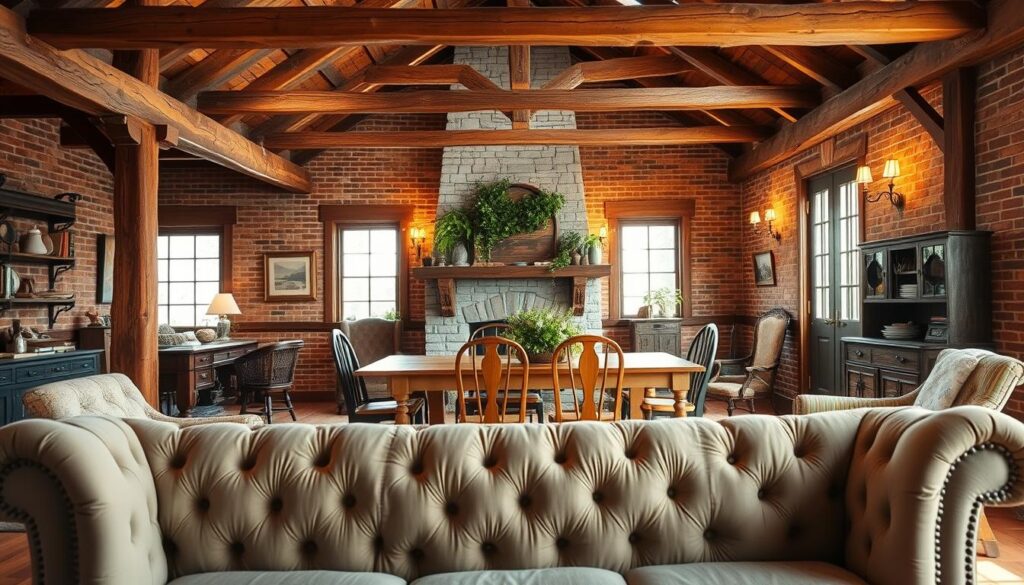
Modern vs. Classic Farmhouse
Farmhouse style ranges from classic to modern. Classic farmhouse is all about traditional rural looks. It includes vintage decor, antique furniture, and worn finishes.
Modern farmhouse mixes these old-school elements with new ones. Think sleek lines, simple decor, and industrial materials. When choosing, think about what you like and your home’s look. Classic is for a traditional feel, while modern adds a modern twist.
Key Features to Incorporate
To make your home farmhouse-style, focus on these key features:
- Rustic Materials: Use wood, stone, and brick for warmth and character.
- Vintage Decor: Add old doors, windows, or furniture for history and charm.
- Neutral Color Palette: Choose white, beige, and gray for a calm feel.
- Textiles: Use throw blankets, rugs, and pillows in wool, cotton, and linen for texture.
With these elements, you can create a cozy farmhouse home. It will show off your style and welcome everyone warmly.
Mid-Century Modern Style
Mid-century modern design is known for its clean look, organic shapes, and creative use of materials. It emerged in the mid-20th century and is now a key part of interior design. It’s famous for its sleek lines and a touch of retro charm.
Iconic Furniture and Décor
The mid-century modern style is marked by its iconic furniture. Pieces like the Eames Lounge Chair and the Noguchi Coffee Table are well-known. They often have clean lines, organic shapes, and use materials like wood, metal, and glass.
Key Furniture Pieces:
- Eames Lounge Chair
- Noguchi Coffee Table
- Tulip Table
- Wassily Chair
To bring mid-century modern style into your home, add these iconic furniture pieces. Decorate with abstract art, geometric patterns, and natural textiles to complete the look.
How to Achieve the Look
To get the mid-century modern look, focus on simplicity and functionality. Emphasize horizontal and vertical lines. Here are some tips:
- Use a neutral color palette with bold color accents.
- Incorporate natural materials like wood and stone.
- Add iconic furniture pieces.
- Use geometric patterns and abstract art.
Mid-century modern style offers a lot of inspiration for interior design. By mixing clean lines, organic shapes, and different materials, you can create a timeless and modern look.
Here’s a comparison of different interior design styles, highlighting mid-century modern’s unique features:
| Style | Key Features | Color Palette |
|---|---|---|
| Mid-Century Modern | Clean lines, organic shapes, mix of materials | Neutral with bold pops |
| Contemporary | Minimalist, sleek, modern | Monochromatic, bold accents |
| Traditional | Classic, ornate, rich details | Warm, rich colors |
Understanding mid-century modern style’s key elements helps you incorporate it into your home. This creates a stylish and functional space.
Bohemian Style: Free Spirited
Embracing bohemian style means welcoming a free-spirited aesthetic into our home. This style celebrates individuality and personal taste. It uses a mix of colors, textures, and decorative elements.
Layers of Color and Texture
Bohemian style is known for its layered colors and textures. We can mix vibrant hues with materials like velvet, linen, and wood. This creates a space that feels layered and deep.
To add this to our modern decor, start with a bold color palette. Then, layer different textures with furniture, rugs, and accessories. For example, a velvet sofa with a natural fiber rug and wooden accents adds depth.
Personal Touches in Décor
Bohemian style also values personal touches and unique decorative elements. This includes vintage finds, global-inspired artwork, and personal mementos. It’s about making our space tell our story.
To add personal touches, display collections, hang meaningful artwork, or incorporate heirlooms. This makes our space more interesting and gives it history and character.
By embracing bohemian style, we can make our home truly reflect our personality and aesthetic. It’s about mixing different elements to create a unique and eclectic space.
Coastal Style: Breezy and Relaxed
The coastal style brings the calm of the ocean into your home. It’s all about creating a peaceful atmosphere, like a seaside getaway.
To get this look, focus on elements that show the coast’s natural beauty. The color scheme is key, inspired by the sea and its surroundings.
Color Schemes Inspired by Nature
A coastal color palette includes blues, whites, and sandy neutrals. These colors make your home feel bright and airy, like being by the sea.
Key Colors for a Coastal Palette:
- Soft blues and whites
- Sandy neutrals and beige
- Seafoam greens and aqua
- Driftwood grays and weathered wood tones
Use these colors for walls, furniture, and accessories. A contrasting color scheme adds depth. A monochromatic scheme creates a soothing look.
| Color | Usage | Effect |
|---|---|---|
| Soft Blue | Walls, Bedding | Calming, Serene |
| Crisp White | Trim, Furniture | Bright, Airy |
| Sandy Neutral | Furniture, Rugs | Warm, Inviting |
Incorporating Nautical Elements
Nautical elements add authenticity and charm to coastal style. Use natural materials like wicker and jute. Decorate with items that show maritime culture.
Nautical Decor Ideas:
- Use natural fibers for rugs and upholstery.
- Incorporate shells, driftwood, and other beach finds into your decor.
- Hang nautical-themed artwork or vintage navigational instruments.
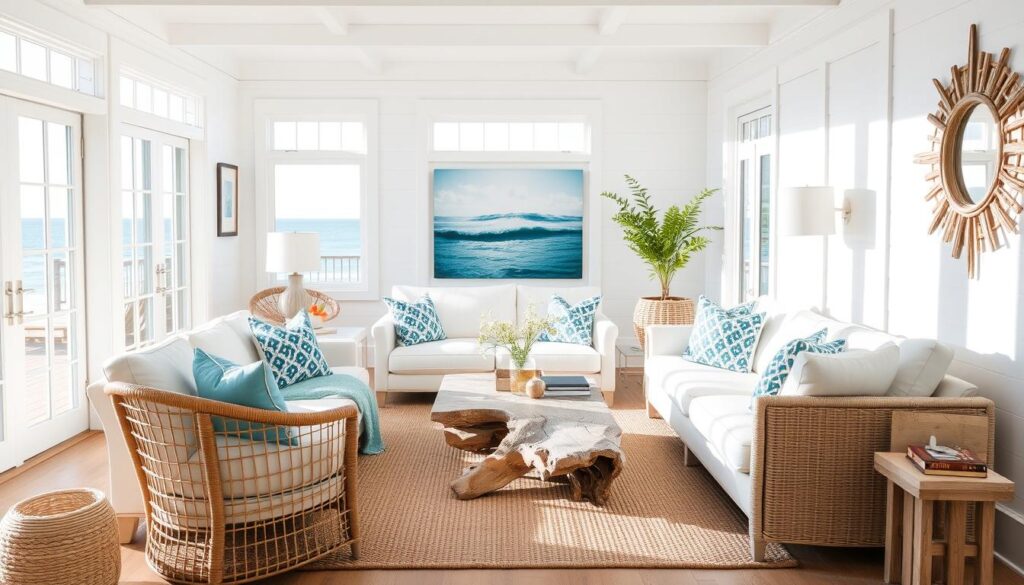
Combine nature-inspired colors with nautical elements for a coastal style. This trend is great for those who love the ocean’s calm.
Japanese Zen Style
The Japanese Zen style focuses on simplicity to create a calm living space. It’s not just about looks; it’s about making a space that helps you relax and feel good.
Simplicity at Its Core
At the heart of Japanese Zen style is simplicity. It means removing things we don’t need. We focus on clean lines, little decoration, and natural materials. This minimalist home design makes spaces feel open and calm.
Some key elements of simplicity in Japanese Zen design include:
- Using natural materials like wood, stone, and paper
- Adding plants and greenery for a natural touch
- Choosing neutral colors to keep things calm
Creating Tranquil Spaces
Creating a calm space is more than just looks. It’s about designing a place that helps you relax and lowers stress. Japanese Zen style does this with smart space planning, careful lighting, and the right textures and colors.
| Design Element | Purpose | Examples |
|---|---|---|
| Natural Light | Improves mood and cuts down on artificial light | Large windows, skylights |
| Neutral Colors | Makes things calm and peaceful | Beige, white, soft grays |
| Textured Elements | Brings depth and interest | Wooden furniture, woven baskets |
By using these elements, we can make a home that’s not just pretty. It’s also peaceful and refreshing.
Choosing the Right Style for Our Space
Finding the perfect interior style for our home is a journey. It’s about understanding our personal tastes and matching them with design aesthetics. With many styles out there, like traditional interior decor and contemporary home interiors, it can be tough. But it’s also a chance to make a space that shows who we are.
Assessing Our Personal Preferences
To pick the right style, we must first know what we like. We should think about our lifestyle, favorite colors, and the mood we want our home to have. For example, if we like simple and clean designs, contemporary home interiors might be perfect. But if we prefer a cozy, classic feel, traditional interior decor could be better.
It’s also important to consider our home’s architecture. This can guide our design choices. A modern home might suit contemporary styles, while a historic home might need traditional decor.
Blending Styles for Unique Spaces
Choosing one style can give a unified look, but mixing styles can make a space truly unique. The trick is to find common elements that link the different styles. For instance, mixing traditional warmth with contemporary simplicity can create a welcoming and stylish space.
To explore different interior styles and find the right one for our space, we can check out Satori Loka. They offer inspiration and advice.
Tips for Implementing Interior Styles
Choosing a home interior style needs careful planning and execution. Whether it’s luxury home styling or rustic interior design, the success depends on the details.
Practical DIY Decor Ideas
DIY decor ideas are perfect for those who love hands-on projects. They let us add personal touches to our space. We can repurpose old furniture or create our own wall art, making our home truly ours.
Collaborating with Professionals
For complex or high-end designs, working with professionals is wise. Interior designers offer expert advice on luxury home styling. They help us achieve a sophisticated, cohesive look.
For rustic interior design, professionals can find authentic materials and furnishings. This ensures our space matches our desired aesthetic.
By planning carefully, being creative, and seeking professional help when needed, we can make our interior style come alive. We’ll enjoy a beautiful, functional living space.

